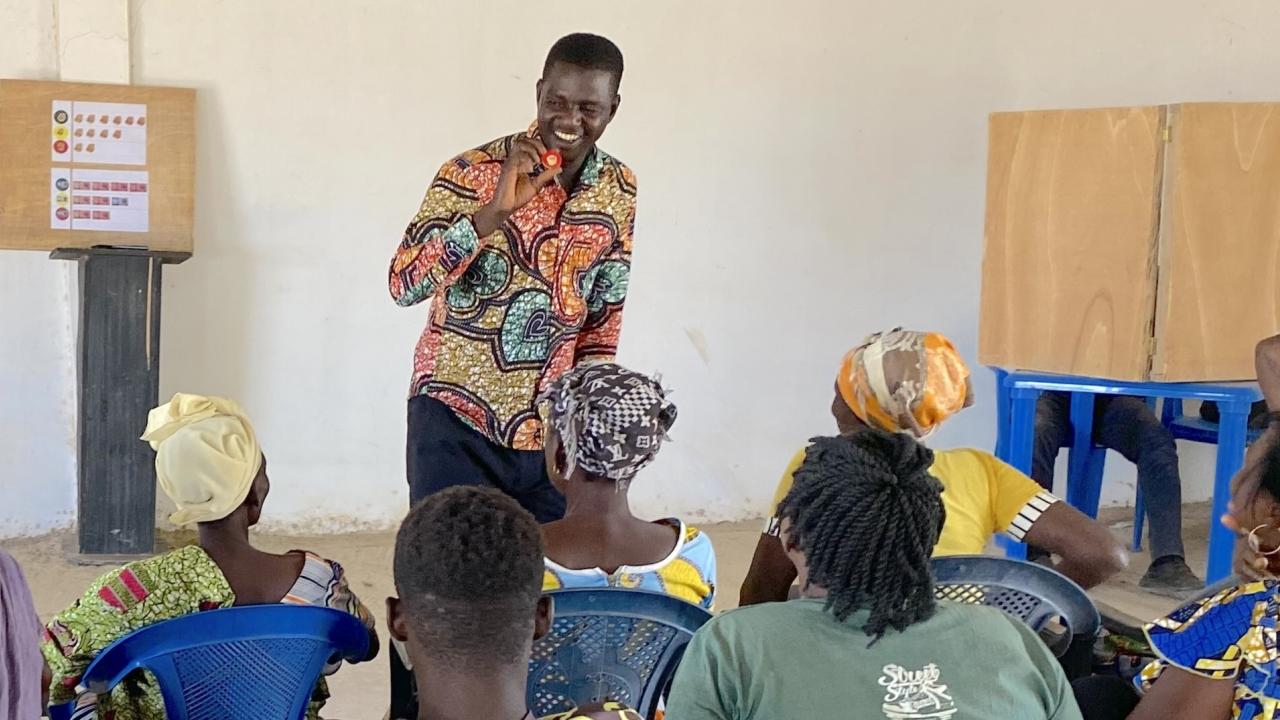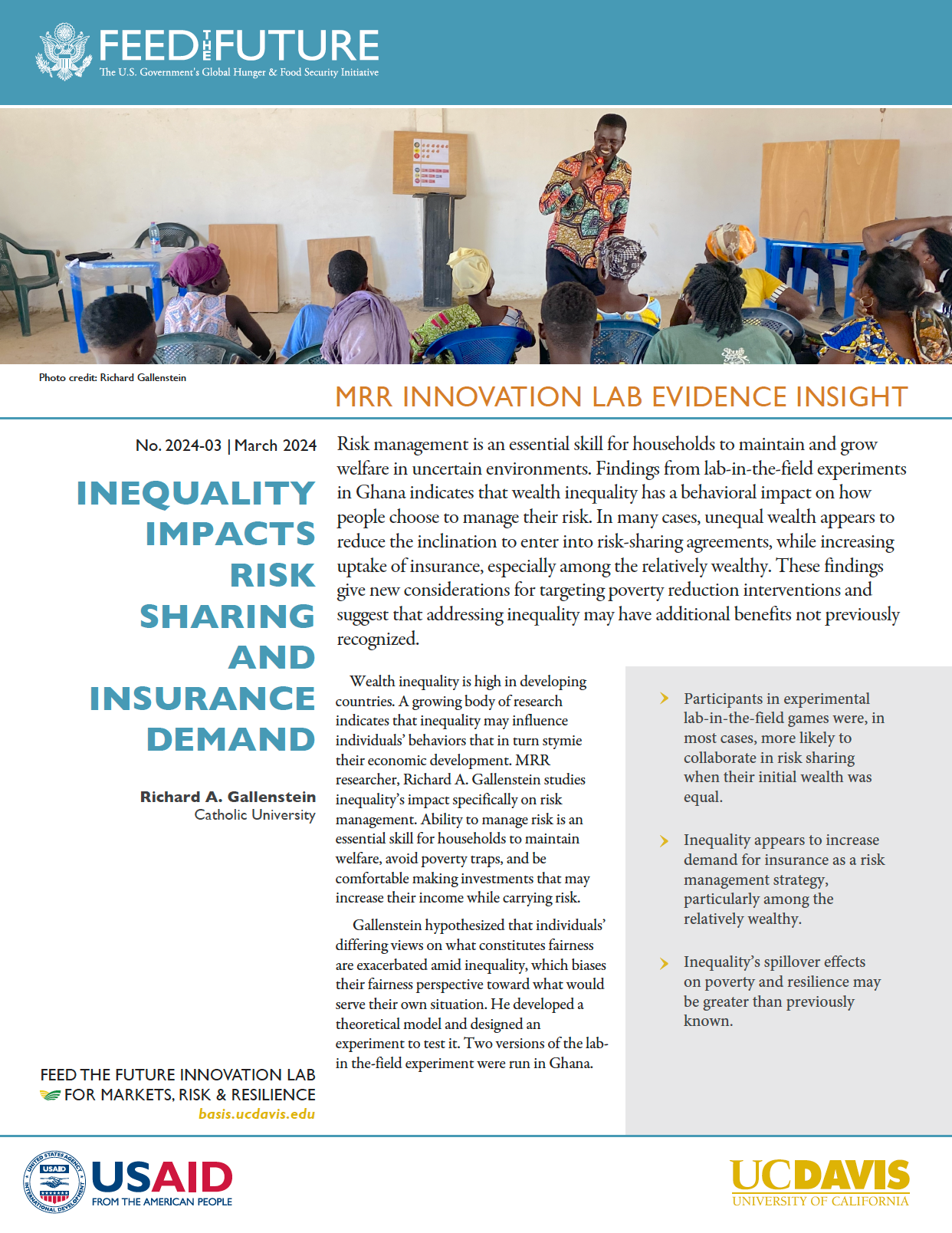
Risk management is an essential skill for households to maintain and grow welfare in uncertain environments. Findings from lab-in-the-field experiments in Ghana indicate that wealth inequality has a behavioral impact on how people choose to manage their risk. In many cases, unequal wealth appears to reduce the inclination to enter risk sharing agreements, while increasing uptake of insurance, especially among the relatively wealthy. These findings lend new considerations to poverty reduction interventions and suggest that addressing inequality may have additional benefits not previously recognized.
Wealth inequality is high in developing countries. A growing body of research indicates that inequality may influence individuals’ behaviors that in turn stymie their economic development. MRR researcher, Richard A. Gallenstein studies inequality’s impact specifically on risk management. Ability to manage risk is an essential skill for households to maintain welfare, avoid poverty traps, and be comfortable making investments that may increase their income while carrying risk.
Gallenstein hypothesized that individuals’ differing views on what constitutes fairness are exacerbated amid inequality, which biases their fairness perspective toward what would serve their own situation. He developed a theoretical model and designed an experiment to test it. Two versions of the lab-in the-field experiment were run in Ghana.
Highlights
- Participants in experimental lab-in-the-field games were more likely to collaborate in risk sharing when their initial wealth was equal.
- Inequality appears to increase demand for insurance as a risk management strategy, particularly among the relatively wealthy.
- Inequality’s spillover effects on poverty and resilience may be greater than previously known.
Lab-in-the-field experiment
In both versions of the experimental game, participants received an initial endowment, to be invested in a risky project that will return a 3x yield if successful and nothing if unsuccessful. Success was determined by a draw of a colored ball from a bag that contained seven success balls and three failure balls.
Participants also received information on an anonymous partner’s endowment. Anonymity allowed the experiment to isolate a behavioral response to inequality alone, uninfluenced by social connections with real histories and futures.
Participants had an option to manage risk through entering into a risk-sharing agreement with their partner. In some rounds, they also had the option of purchasing insurance. Equality or inequality of partners’ endowments changed between rounds.
In one experiment, participants set their own risk-sharing offer amounts, while in the other experiment, the risk sharing offers were held constant between equality and inequality rounds. The former design more closely mirrored real-world decisions, while the added level of control in the constant-offer design allowed a cleaner look at the behavioral response to inequality.

Participants were individuals in the Upper East region of Ghana, mostly from semi-subsistence farming households. The experimental game with fixed risk-sharing amounts was played by 158 volunteers and a total of 442 played the version where they could make their own risk sharing offers. Participants were incentivized to try their best by being allowed to keep their winnings from a randomly selected round.
Inequality Affects Risk Management
When risk-sharing amounts were held constant across equality and inequality rounds, the effect of inequality was mixed. Participants were more likely to share risk if their partner’s wealth was lower than their own, and less likely if their partner’s wealth was higher. Inequality increased demand for insurance among both the relatively wealthy and poor participants.
In the experiment that allowed participants to make their own risk sharing offers, participants under inequality expected a larger share of income, and both the relatively poor and relatively wealthy had reduced risk-sharing acceptance rates. Inequality also increased insurance demand in this experiment, but only among those randomly assigned to the higher wealth level.
The findings provide suggestive evidence that behavioral impacts of inequality are driven in part by different preferences and views of what constitutes fairness. As unequal wealth widens differences in perspectives on fairness, people have a harder time reaching agreements, and therefore become less likely to participate in interpersonal risk-sharing. This makes insurance, which is impersonal, more attractive.
Poverty Reduction amid Inequality Spillovers
This behavioral response to inequality may affect the frequency and nature of risk-sharing agreements in real-life, risky contexts. Amid inequalities in wealth, the relatively poor and relatively wealthy are more likely to have differing expectations of risk sharing and thus be less able to reach agreement.
In light of these findings, development interventions that increase wealth among only some parts of a community might consider the potential implications on social capital, specifically risk sharing among community members. While the wealthier might respond to a dissolution of former social arrangements by purchasing insurance, these results indicate that the poor might find themselves with fewer risk-management tools, creating a vicious cycle that pushes the poor deeper into poverty.
On the other hand, this logic suggests positive spillover effects of addressing inequality. Growing the wealth of the poor could potentially increase the resilience of a larger population, as we expect more risk sharing among a more equal society.
Though the game’s simplified insurance offering differs from real-world products, its increased uptake amid inequality, especially the wealthy, is significant and likely occurs in reality. Access to formal financial instruments may be particularly important in unequal societies where less informal risk management occurs. Demand for insurance may be higher in unequal societies, at least among the relatively wealthy. In such contexts, additional effort may be needed to reach the poor with insurance.
